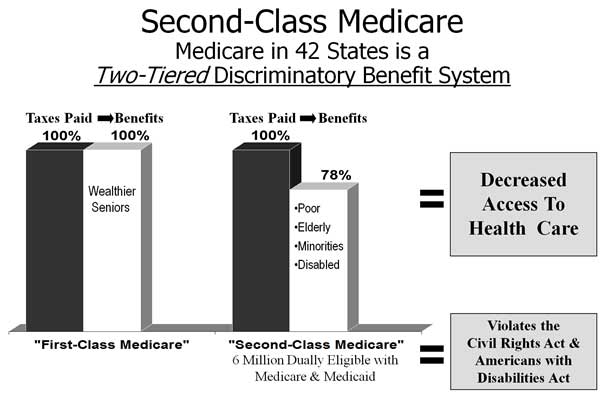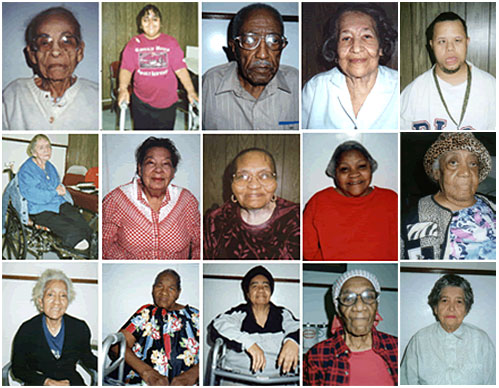Second-Class Medicare for Dually Eligible People
Dually Eligible People with Medicare and Medicaid are:
- the oldest, poorest, sickest, and most disabled people in the nation.
- 12 million low-income Medicare patients who also have Medicaid.
- disproportionately elderly people of color and mentally and physically disabled people.
- the fastest-growing and most expensive Medicare population.
The Balanced Budget Act of 1997 Created Second-Class Medicare for Dually Eligible People with Medicare and Medicaid:

- Wealthier Medicare patients get access to first-class Medicare, while 6 million poor patients get access to second-class Medicare.
- Medicare in 42 states is a two-tiered discriminatory benefit system where 6 million poor people receive only 78% of their promised Medicare benefit.
- The remaining 22% is uncollectible “Medicare bad debt” — a poverty penalty for dually eligible people with Medicare and Medicaid.
- Dually eligible people are disproportionately elderly people of color and mentally and physically disabled people, all of whom are poor.
“Turning healthcare disparity into healthcare equality while saving healthcare dollars”
NACDEP, the National Coalition for Dually Eligible People, https://nacdep.org
“Of all the forms of inequality, injustice in health care is the most shocking and inhumane.”
— Martin Luther King, Jr.

Dually Eligible People with Medicare and Medicaid — At the Center of the Next Debate:
Because of their medical frailty, their social and racial demographics, their great expense, and their expanding growth rate, dually eligible people — “the elderly and disabled poor” — will occupy a central position in the upcoming debates over national healthcare financing and disparities in health care in the 21st century.
Sheldon M Hersh, MD
Louisiana Geriatrics Society Annual Meeting
New Orleans, Louisiana, 2003
Excerpts from the Paper
Concentrated poverty and residential segregation in New Orleans …
“I was able to gather 303 community-dwelling dually eligible Medicare patients in my practice because of concentrated poverty and residential segregation in New Orleans.”
Disproportionate racial impact in New Orleans …
“The Balanced Budget Act has a disproportionate racial impact in New Orleans and elsewhere.”
Providing the least Medicare access for the most disabled people …
“Providing the least Medicare access for the most disabled people violates the Americans with Disabilities Act.”
A legal, de jure segregated medical system …
“For dually eligible people, the Balanced Budget Act turned an informal, de facto segregated medical system, into a legal, de jure segregated medical system.”
